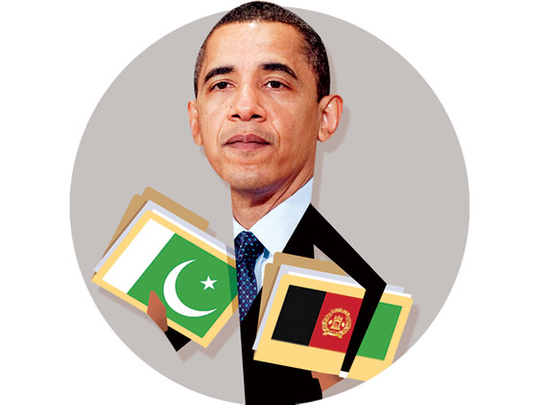
The Obama administration's year-end review of its strategy in Afghanistan and Pakistan, released last week, was intended to be cautiously reassuring: Yes, there are challenges, but military progress is being made. Overall, President Barack Obama said, "We are on track to achieve our goals." On closer reading, though, even the carefully written five-page public summary of the review isn't as reassuring as some of the headlines it earned.
In Afghanistan, it says, the growth of the Taliban insurgency has been slowed, but that achievement is "fragile and reversible." In Pakistan, progress in the shadowy war against extremists has been "substantial," but not enough to deny either Al Qaida or the Afghan Taliban the havens that shelter them from defeat. That will require much more military action than the Pakistanis have been willing to undertake so far. And the report — at least the public version — barely mentioned some of the most daunting problems facing the US in Afghanistan. "Emphasis must continue to be placed on the development of Afghan-led security and governance," it said. Translation: In many areas, there's still no functioning Afghan government or police force.
The word "corruption" never appeared; the administration's rocky relationship with Afghanistan's mercurial president Hamid Karzai, got no mention. Nor did it make much of a case that Pakistan, which is focused on its own problems, is likely to commit more troops and take more risks to help the US and Afghanistan.
More important, the report's on-the-ground focus meant it also largely ignored three of the biggest factors shaping the future of the US enterprise in Afghanistan and Pakistan: time, cost and the support of the American people. The US-led war in Afghanistan is already in its 10th year, even though it has only been waged at its current full strength of 140,000 American and allied troops for the last six months.
Proof of concept
Initially, US military officials hoped to show quick successes on the ground that would provide what they call "proof of concept" in time for last week's report. That timetable, like every timetable in Afghanistan, has slipped; proof of concept is now on the agenda for a full review that is scheduled for July next year.
Some officers are already saying that even then they may need more time to show what they can do, and they are readying their arguments in favour of the slowest possible drawdown of troops. The US and the North Atlantic Treaty Organisation (Nato) have embraced Karzai's target of turning over principal responsibility for the war to Afghan forces by the end of 2014, but that goal is only "aspirational," a Pentagon spokesman has said.
And handing off to the Afghans won't mean a complete withdrawal of US troops; officials have estimated that at least 35,000 would stay behind as advisers, even under a best-case scenario. The longer the war continues, the more it costs in both lives and money. Because of stepped-up military operations, US deaths in Afghanistan are on track to reach 500 this year, up from 317 last year. The financial cost is heavy too — more than $100 billion a year, money the cash-strapped US government can ill-afford.
Given the toll in casualties and costs, it's not surprising that public support for the war has eroded. A poll by the Pew Research Centre last month found for the first time that more Americans (47 per cent versus 44 per cent) favour an early withdrawal from Afghanistan over staying until the country is stabilised. Obama has built escape hatches into his policy if it begins to look as if the current strategy isn't working. The president didn't fully embrace the ambitious counterinsurgency strategy proposed by generals Stanley A. McChrystal and David H. Petraeus last year.
Limited version
Instead, he gave them enough troops for a limited version, with a deadline of July 2011 to start downsizing. He insisted, as he has before, that US goals in Afghanistan are limited to denying a haven to Al Qaida. He promised to stay committed to the fight against terrorism, but didn't tie himself to any one strategy.
Still, Obama's decisions on the war so far have been to give his military commanders what they requested with only modest adjustments. His course has been marked by caution, not audacity. So even though he faces a more serious strategic decision by July next year, the pattern so far suggests that he's likely to make another incremental decision — a modest drawdown of troops, followed by another review in another six months.
So where do we stand? As Obama said, "We are on track to achieve our goals." But we are on track to achieve them some time after 2015, when the US forces in Afghanistan will be in their 15th year of the war.









